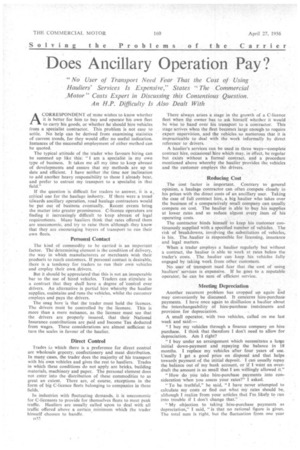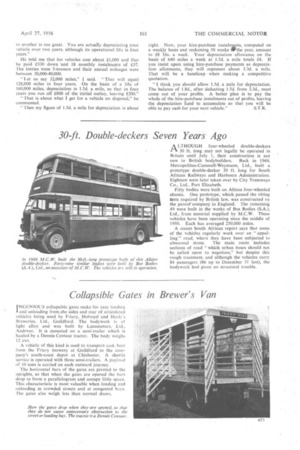Does Ancillary Operation Pay?
Page 82

Page 91

If you've noticed an error in this article please click here to report it so we can fix it.
"No User of Transport Need Fear That the Cost of Using Hauliers Services Is Expensive," States "The Commercial Motor" Costs Expert in Discussing this Contentious Question. An Hi'. Difficulty Is Also Dealt With A_ CORRESPONDENT of mine wishes to know whether it is better for him to buy and operate his own fleet to carry his goods, or whether he should hire vehicles from a specialist contractor. This problem is not easy to settle. No help can be derived from examining statistics of current trends, for they would offer no useful indication. Instances of the successful employment of either method can be quoted.
The typical attitude of the trader who favours hiring can be summed up like this: " I am a specialist in my own type of business. It takes me all my time to keep abreast of developments and ensure that my methods are up to date and efficient. I have neither the time nor inclination to add another heavy responsibility to those I already bear, and prefer to entrust my transport to a specialist in that 'field."
If the question is difficult for traders to answer, it is a,
critical one for the haulage industry. If there were a trend tcrwards ancillary operation, road haulage contractors would be put out of business eventually. Recent events bring the matter into greater prominence. C-licence operators are finding it increasingly difficult to keep abreast of legal requirements. Many hauliers think that rates offered them are uneconomic, and try to raise them although they know that they are encouraging buyers of transport to run their own fleets.
Personal Contact The kind of commodity to be carried is an important factor. The determining element is the condition of delivery, the way in which manufacturers or merchants wish their products to reach customers. If personal contact is desirable, there is a tendency for traders to run their own vehicles and employ their own.. drivers.
But it should be appreciated that this is not an insuperable bar to the use of hired vehicles, Traders can stipulate in a contract that they shall have a degree of 'control over drivers. An alternative is partial hire whereby the haulier supplies, maintains and runs the vehicles, whilst the customer employs and pays the drivers.
The snag here is that the trader must hold the licences. The drivers must be controlled by the licensee. This is more than a mere nuisance, as the licensee must see that the drivers are properly insured, that their National Insurance contributions are paid and Income Tax deducted from wages. These considerations are almost sufficient to turn the scales in favour of the haulier.
Direct Control
Trades Li which there is a preference for direct control are wholesale grocery, confectionery and meat distribution. In many cases, the trader does the majority of his transport with his own vehicles and gives the rest to hauliers. Trades in which these conditions do not apply are bricks, building materials, machinery and paper. The personal element does not enter into the distribution of these commodities to as great an extent. There are, of course, exceptions in the form of big C-licence fleets belonging to companies in these fields.
In industries with fluctuating demands, it is uneconomic for C-licensees to provide for themselves fleets to meet peak traffic. Hauliers are usually called upon to deal with all traffic offered above a certain minimum which the trader himself chooses to handle.
1132 There always arises a stage in the growth of a C-licence fleet when the owner has to ask himself whether it would be wise to hand over his transport to a contractor. This stage arrives when the fleet becomes large enough' to require expert supervision, and the vehicles so numerous that it is impracticable to deal with the work informally by direct reference to drivers.
A haulier's services can be used in three ways—complete contract hire, occasional hire which may, in effect, he regular but exists without a formal contract, and a procedure mentioned above whereby the haulier provides the vehicles and the customer employs the drivers.
Reducing Cost
The cost factor is important. Contrary to general opinion, a haulage contractor can often compete closely in his prices with the direct costs of an ancillary user. Taking the ease of full contract hire, a big haulier who takes over the business of a comparatively small company can usually. compete on cost. The haulier is able to buy his supplies at lower rates and so reduce almost every item of his operating costs.
The contractor binds himself to keep his customer continuously supplied with a sPecifted number of vehicles, The risk of breakdowns, involving the substitution of vehicles, is his. The haulier is responsible for licensing, insurance and legal matters.
When a trader employs a haulier regularly but without a contract, the haulier is able to work at rates below the trader's costs. The haulier can keep his vehicles fully engaged by taking work from other, customers.
No user of transport need fear that the cost of using hauliers' services is expensive. If he goes to a reputable operator, he can be sure of efficient service.
Meeting Depreciation
Another recurrent problem has cropped up again ;Crid may conveniently be discussed. It .concerns hire-purchase payments. I have once again to disillusion a haulier about the 'interchangeability of hire-purchase instalments and provision for depreciation.
A small operator, with two vehicles, called on me last week and said:—
" I buy my vehicles through a finance company on hire purchase. I think that therefore I don't need to allow for depreciation. Am I right?
• "I buy under an arrangement which necessitates a lane initial down-payment and repaying the balance in 18 months. I replace my vehicles after four years of use. Usually I get a good price on disposal and that helps towards payment of the initial deposit. I can usually repay the balance out of my bank account, or if I want an overdraft the amount is so small that I am willingly allowed it." "How do you take hire-purchase payments into consideration when you assess your rates?" I asked.
"To be truthful," he said, "I have never attempted to calculate my costs or find out what my rates should be, although I realize from your articles that I'm likely, to run into trouble if I don't change that."
"My objection to taking hire-purchase payments as depreciation," I said, "is that no rational figure is given. The total sum is tight, but the fluctuation from one year to another is too great. You are actually depreciating your vehicle over two years, although its operational life is four years."
He told me that his vehicles cost about £1,000 and that he paid £330 down and 18 monthly instalments of £37. [he lorries were 5-tonners and their annual mileages were between 30,000-40,000.
"Let us say 32,000 miles," I said. "That will equal 128,000 miles in four years. On the basis of a life of 160,000 miles, depreciation is 1.5d. a mile, so that in four years you run off £800 of the initial outlay, leaving £200."
"[hat is about what I get for a vehicle on disposal," he commented.
" Then my figure of 1.5d. a mile for depreciation is about right. Now, your hire-purchase instal runts, computed on a weekly basis and reckoning 50 weeks W the year, amount to £8 16s. a week. Your depreciation allowance on the basis of 640 miles a week at 1.5d. a mile totals £4. If you insist upon using hire-purchase payments as depreciation allotments, they will represent about 3.3d. a mile. That will be a handicap when making a competitive quotation.
"I think you should allow 1.5d. a mile for depreciation. The balance of 1.8d., after deducting 1.5d. from 3.3d., must come out of your profits. A better plan is to pay the whole of the hire-purchase instalments out cif profits, leaving the depreciation fund to accumulate so that you will be able to pay cash for your next vehicle." S.T.R.




































































































































